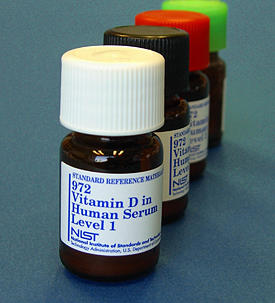
Scientists at NIST and NIH have developed a new Standard Reference Material, SRM 972, Vitamin D in Human Serum, to help laboratories validate the accuracy of their test methods. More accurate laboratory results should make is easier for physicians to diagnose vitamin D deficiency and aid research related to vitamin D in general.
Responding to concerns about the quality and accuracy of methods used by testing laboratories to measure levels of vitamin D in the body, scientists at the National Institute of Standards and Technology (NIST), in collaboration with the National Institutes of Health's Office of Dietary Supplements, have developed a new reference sample for vitamin D in blood serum to help laboratories validate the accuracy of their test methods. NIST Standard Reference Material (SRM) 972, "Vitamin D in Human Serum," represents a first step toward standardization of vitamin D testing.
Vitamin D is a nutrient necessary for good health, but it can be toxic in large doses. The body needs vitamin D to absorb calcium, which promotes proper bone formation in children and helps to maintain bone strength in adults. Studies suggest that vitamin D may also be vital to a number of physiological processes, including proper functioning of the immune system and regulation of the life cycle of cells. There are two forms of vitamin D, known as vitamin D2 and vitamin D3 that contribute to the human body's supply of vitamin D. Sources of vitamin D include food, dietary supplements and exposure to sunlight.
There has been a marked increase in clinical laboratory testing for vitamin D levels in blood in recent years. This is due in part to evidence that vitamin D deficiency may be more common than previously thought and because clinical studies have suggested that sub-optimal levels of vitamin D may be associated with an increased risk of certain diseases. In order to evaluate a person's vitamin D levels, a metabolite known as 25-hydroxyvitamin D, or 25(OH)D, is measured.
Although test methods are readily available for measurement of 25(OH)D, no standardization of 25(OH)D methods currently exists. As a result, "normal" range indicated by measurements from one test method may be different from that of another. This situation can pose problems for physicians attempting to interpret the results from vitamin D testing, and reliable diagnosis of vitamin D deficiency has remained problematic. Improving the accuracy and comparability of these different methods is considered essential for identifying those affected by vitamin D deficiency and for ongoing research related to potential benefits or dangers associated with vitamin D.
SRM 972, Vitamin D in Human Serum, consists of four blood serum sample pools (Level 1 – Level 4) with varying levels of 25(OH)D. SRM 972 has certified values for 25(OH)D2, 25(OH)D3, and 3-epi-25(OH)D3.
Standard Reference Materials are among the most widely distributed and used products from NIST. The agency prepares, analyzes and distributes more than 1,000 different materials that are used throughout the world to check the accuracy of instruments and test procedures used in manufacturing, clinical chemistry, environmental monitoring, electronics, criminal forensics and dozens of other fields. For more information, see NIST's SRM Web page at http://ts.nist.gov/measurementservices/referencematerials. Technical details and ordering information for SRM 972, Vitamin D in Serum, can be found at https://www-s.nist.gov/srmors/view_detail.cfm?srm=972.

